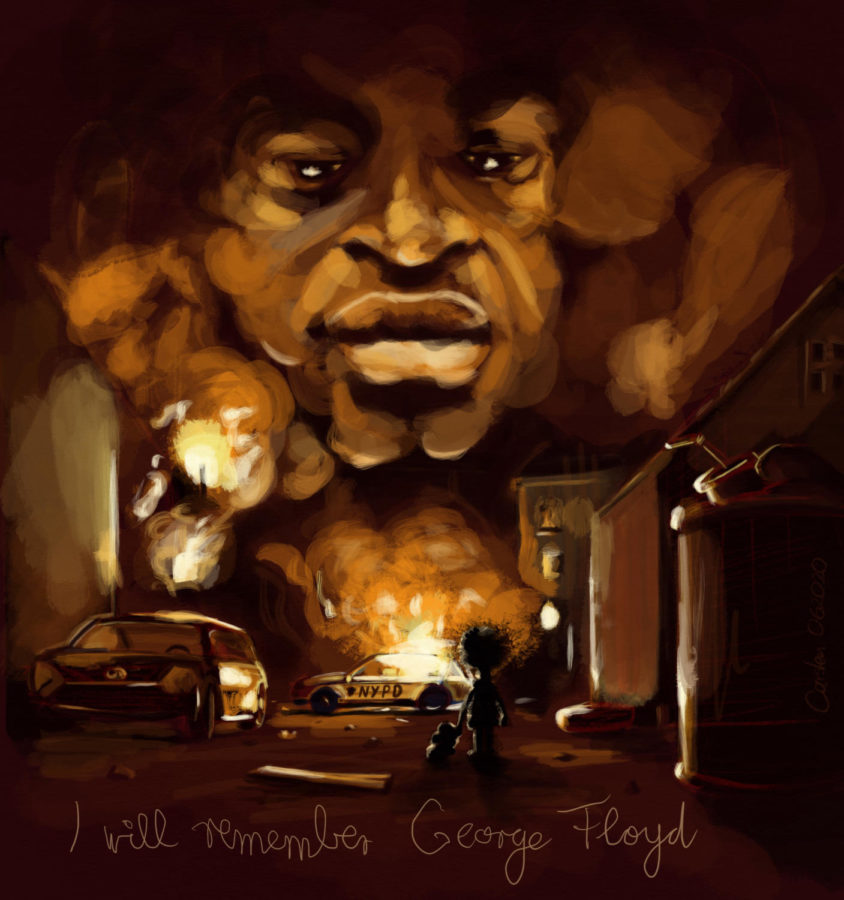Sosa: Immortalization of George Floyd
Columnist Zoami Calles-Rios Sosa calls us to remember that people change and their actions don’t negate the quality of their life.
June 10, 2020
In response to my last article about why we must see color, one of my sister’s acquaintances sent her a video about why George Floyd, “a criminal,” shouldn’t be idolized nor immortalized. The video created by Candace Owens has over six million views on social media combined and garnered attention from all sides. In contrast, the Change.org petition for Justice for George Floyd had over 17 million signatures as of the publication of this article.
At first, I was confused. I was confused because George Floyd is representative of the many injustices that happened before. His death was the proverbial straw that broke the camel’s back. He was another Black man who lost his life in the hands of those that should be serving and protecting it. I was confused because George Floyd did not ask to be murdered. He didn’t ask to be celebrated after his death by millions of people all over the world. George Floyd was not perfect and, yes, had criminal activity in his past, but does that make him a bad person? He had been out of trouble for five years. Does this not point to him changing? Once a criminal, are you always a criminal?
The police were called due to allegations of using a counterfeit bill. The owner of the store, whose new and inexperienced cashier called the cops on Floyd, believes Floyd may not have known it was a fake bill. Mr. Floyd was a regular at the store. The reality of what happened with that bill will not be known as the due process did not play out.
When the report came out that he had drugs in his system, it appeared to justify further the narrative that he was a criminal. I don’t follow any celebrity much, but I’m well aware that there are many who are doing drugs openly or who have recovered. We don’t consider them criminals.
In his “Just Mercy“ book, Bryan Stevenson writes about a time that forever changed my life.
It starts with the humiliation he had to go through when seeing a client in jail. As a young Black lawyer, he was constantly subjected to the whims and made-up rules of the guards in the entrance of the prisons. Before seeing his client, he was asked to strip naked for a search. This was not the procedure for a lawyer seeing his client, but he put up with it.
As time goes, that same guard has to accompany Stevenson’s client to a court hearing. In it, the guard is exposed to the terrible life the accused had to endure going through the foster care system. The guard has a change of heart. The next time Stevenson visits his client, he is no longer asked to strip. The guard says, “I’m glad you’re here because I want to tell you something: I came up in the foster system too. I had it really bad. I didn’t think anybody had it as bad as I did. But listening in that courtroom, I realized that maybe your client had it worse than I did.”
I remember reading this and crying. I was crying because I could understand the pain all around: the client’s, the guard’s and Stevenson’s. Every single one was carrying and dealing with pain in their own way.
Stevenson taught me how to be compassionate and see the human being beneath it all. That we are better “than the worst thing we’ve ever done.” Sometimes this is so hard to see. Over the past few years, I’ve struggled to see beyond some of the wrongs people have committed. It was easy to judge others and move on. But we can’t afford to do that anymore. That inability to see someone else as a whole person has caused us to be here. For over four centuries, people of color have not been seen as equals in this great country. We have made progress, but we still have ways to go.
We do not know the life of George Floyd, only the highlights, whether good or bad. Filling in the gaps from those highlights is left to our prejudices and biases. Was he a good man? Was he a criminal? Or was he another human being trapped in a systematic cycle that didn’t allow him room to leave? We will never know, but I will choose to see Mr. Floyd in the best way possible. He may have made poor choices in the past and there will be those who will mark him as a criminal for life.
However, to others, he was a friend, a father, a son, a partner. In regards to Ms. Owens’ video, no one can make you idolize anyone. This is what makes this country so remarkable. The ability to speak up against something you don’t believe to be true is truly a gift. As for George Floyd becoming immortalized as a symbol for the movement of Black Lives Matter and police brutality, the world has spoken.

















